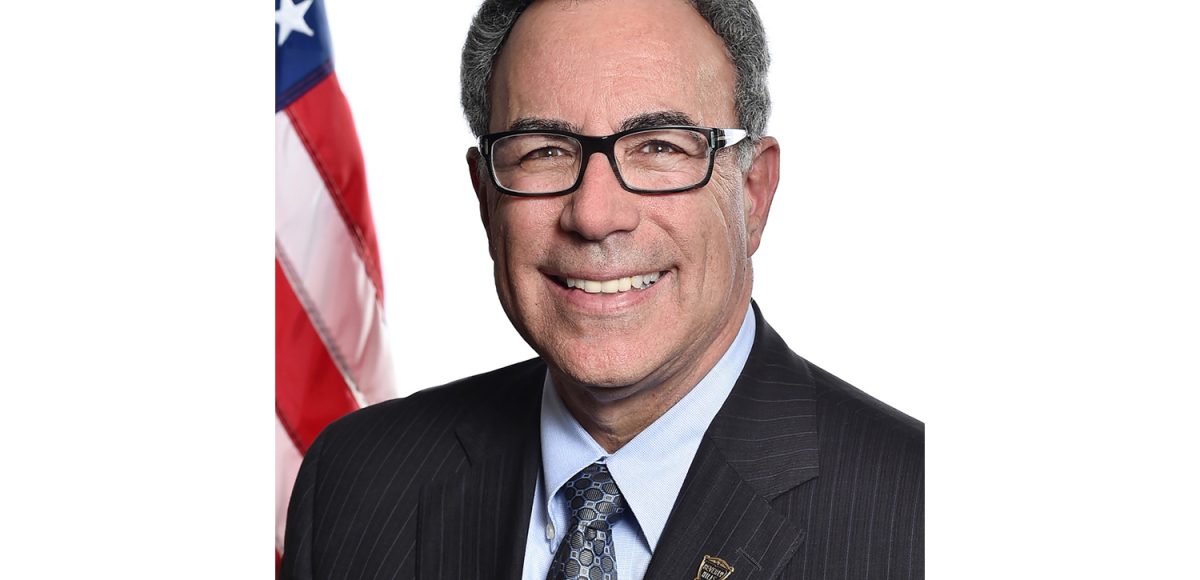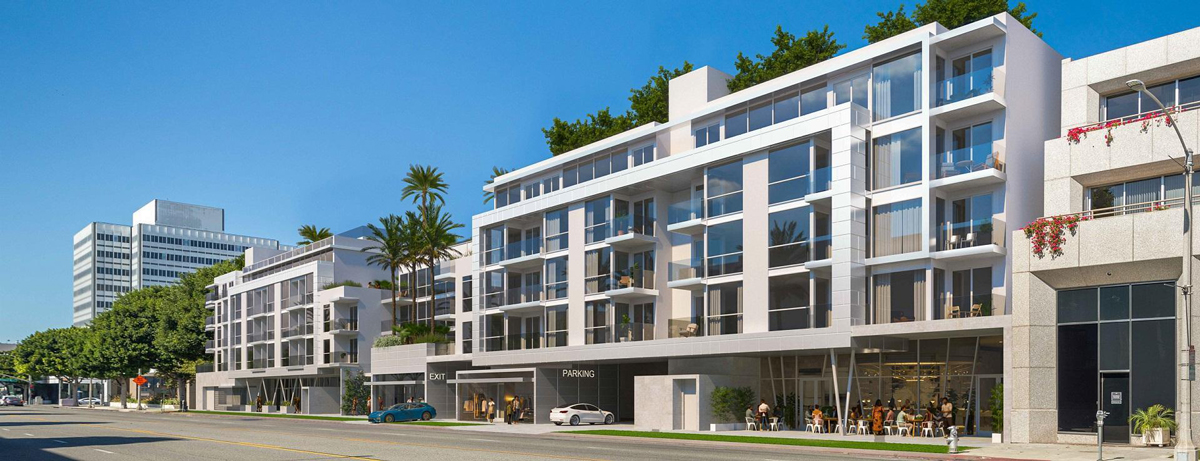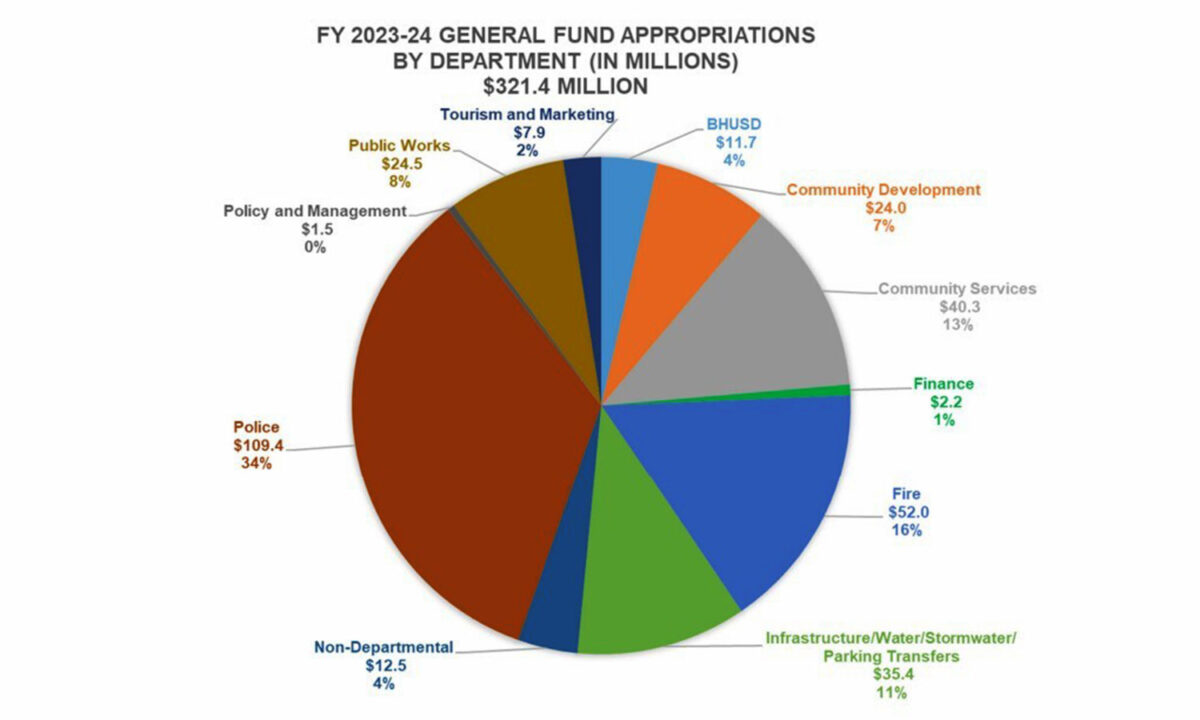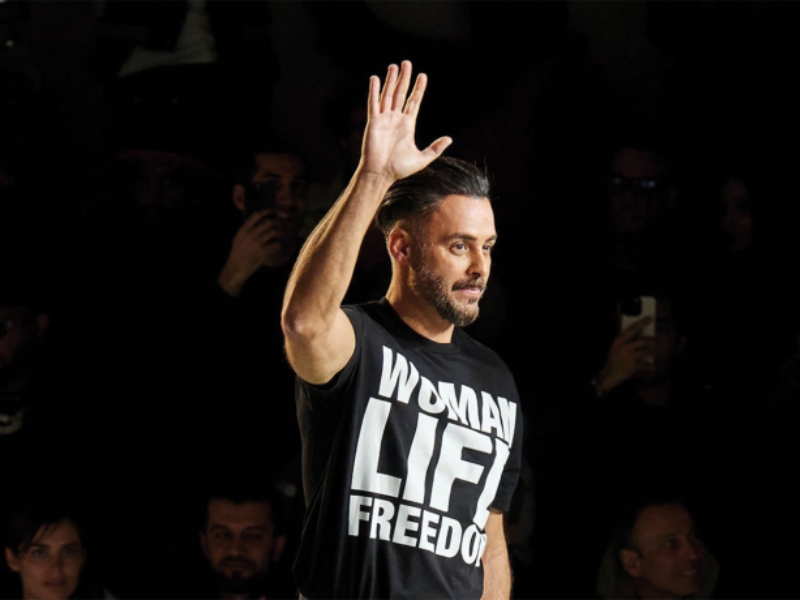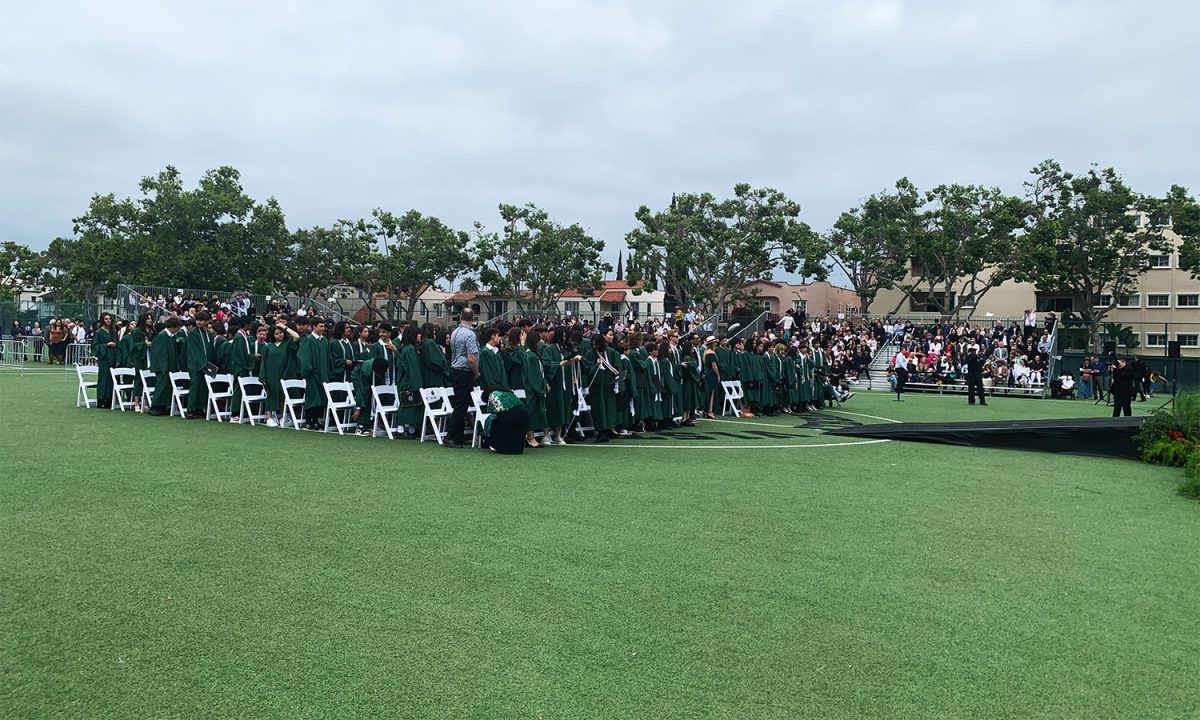Mayor Lester Friedman leaves office on April 6, marking the end of a term dominated by a global health crisis, civil unrest, a general election, and the steady nationalization of local politics. Friedman entered office just as the country belatedly recognized the threat posed by the COVID-19 pandemic, leaving local governments scrambling to respond in the absence of a coordinated federal strategy. He steps down from his first mayoral stint as the city appears on the cusp of a tentative recovery, with Beverly Hills boasting one of the highest vaccination rates in the county at 45.5 percent.
Mayor Friedman came to the City Council in 2017, having previously served on the Traffic and Parking Commission from 2011 to 2017. A lawyer by trade, he will remain on the City Council for another year before coming up for reelection. He has not announced whether he intends to run for a second term.
The position of mayor carries less executive power in Beverly Hills than it does in other cities like Los Angeles. Nonetheless, the largely procedural role can shape agendas and focus the attention of the City Council on particular issues and away from others. The mayorship rotates through the City Council each year. Councilmember Robert Wunderlich will take over for Mayor Friedman on April 6 in a remote ceremony.
BHC: Other members of the Council had the opportunity to enact signature programs during their tenures as mayor. You served under extraordinary circumstances and were playing defense for much of the term. Tell us about the projects you had in mind going in that you would have shepherded through had the times not been as they were.
Friedman: My main objective this year was…Beverly Hills Together. My goal was to do whatever I could to integrate the different portions of our community: the senior community, the school community, the city community. I really wanted everyone to be working together towards a common goal of togetherness. In the past, we’ve had some community issues, in terms of the integration of the school district activities with the city activities, and I just wanted to see if we could put everything together with the seniors, the young kids and our city.
BHC: You have a big family that’s heavily involved in the community. Is that partially where that idea comes from?
Friedman: Yeah, absolutely. All of my children went through the school district, my grandchildren are going through the school district, and I just felt there was a little bit more that could be done to make it a more cohesive opportunity for the entire community. Integrating the business community into it, also. I just felt that everybody was going down their own track. At least that was my goal going in until you know, the rug got pulled out.
BHC: Let’s talk about that. At what point did you realize how serious things were getting?
Friedman: Let’s go back one year. I was in Las Vegas doing the PAC 12 tournament. I usually spend about a week there doing it. And then, all of a sudden, we were told that everything was being shut down in Las Vegas and that we all had to get home as soon as we could. That was kind of the bell that rung. That was the 12th of March. And then coming home and speaking to our city staff about steps that were being taken to basically close us down. All of a sudden, that was like a slap in the face. Wake up, the world has changed.
BHC: So, when you did assume the mayoral seat, you were taking the reins in the midst of an unfolding crisis. What were your immediate priorities?
Friedman: Well look, the job of local government officials is always the safety and security of the community, whether that be the economic health, or the actual security…or, as it turned out, the health of our community. Those were the three goals that I had: health, security and safety.
BHC: No sooner than you were dealing with a pandemic than Beverly Hills saw the beginning of an unprecedented period of unrest. We’re a month away from the anniversary of when Beverly Hills saw looting and vandalism. Can you take me to that day?
Friedman: Looking back on it, the city was prepared for what was going to be an event at Pan Pacific Park. We had contacted all of our neighboring communities and had set up, in the event there were going to be any problems, an agreement to provide mutual aid amongst all of the local communities, including Culver City, Santa Monica, West Hollywood, [and] LAPD to some extent, also. There were definitely plans that were made just in case anything would go wrong. As it turns out, things went terribly wrong, in terms of the ability to protect the community and protect those who were peaceful protesters who decided to march to the City of Beverly Hills. The local communities were all overwhelmed in terms of the amount of safety precautions that needed to be taken, and commitments to aid each other were not able to be carried out because each of the communities had their own issues. We know what happened to the Beverly Fairfax area. We know what happened in Santa Monica; we know what happened in West Hollywood. Those peaceful protesters were infiltrated by those who wanted to do wrong. And all of a sudden, we had what turned out to be a very unfortunate situation that occurred, not from the peaceful protesters, but those who took advantage of it.
BHC: Starting last July, a new kind of protest came to Beverly Hills. These were a mix of people who protesting COVID-19 public health restrictions and showing support for President Donald Trump. Pretty early on you had your own encounter with these protesters. At one point a group of protestors went to your home. Were you surprised about that?
Friedman: I don’t know [if it was] surprise. I was certainly disappointed–disappointed in the fact that [a group of] mainly non-residents, although there were some residents, would personalize it to the extent of going to an elected official’s home. I volunteered for this position. Some of my children and my grandchildren are living at home. I thought it was extremely unfair for those individuals who had concerns with policies that the city took, which I guess I am emblematic of, to affect my personal life and those of my grandchildren and children. Now, having said that, the first time [they did that] I came out and addressed those who were in front of my home. I’m not sure that they wanted to hear what I had to say. Every time I would talk they would just talk over me to express their views, but as an elected official, I felt the obligation to go out and address their concerns, but I was disappointed.
BHC: The rallies continued to grow and eventually took over Beverly Gardens Park each Saturday. Can you speak about the challenges that those “Freedom Rallies” started to pose, the feedback you received from the community, and how you balanced those concerns with the protesters’ rights?
Friedman: Certainly, there is an absolute right that people have to protest. That’s one of the fundamental rights we have as American citizens. But when the rights of those individuals start to infringe upon the rights of other individuals, I think there needs to be a balancing act. That is when the community started getting upset in terms of them taking over the entire park area to the exclusion of those who wanted to enjoy its use.
For the most part, I believe that the large groups of people were non-residents. I certainly believe there were residents involved, but I think the residents were greatly outnumbered by the non-residents. Those who came to Beverly Hills did so because of the fact that if you’re in Beverly Hills and you’re protesting, you get press. And that’s exactly what happened. And it grew because of the Beverly Hills name being associated with the protests. It was like a snowball that just kept rolling.
BHC: Moving back to the pandemic…COVID-19 dealt a devastating blow to Beverly Hills, in terms of its impact on the Transient Occupancy Tax (TOT), on sales taxes and other forms of revenue. What measures has the council taken to stave off what could have been economic disaster?
Friedman: There were deferrals of capital expenditures. Some of the capital expenditures are funded through the general budget. Vehicle replacement, deferred maintenance expenses that normally we would have incurred during the regular budget cycle, we went ahead and deferred those up to a year. We were able to cut I believe close to $40 million of anticipated expenses right off the bat. But it’s going to come back in future years. We know we’re going to need to spend it again. We also decided as a council that we didn’t want to have any nonvoluntary layoffs. So, we immediately implemented a voluntary retirement plan.
When you look back on it now, property taxes came in higher than we had anticipated, which softened the blow somewhat, and retail sales taxes didn’t take as much of a hit as we had originally thought. TOT took as significantly a hit as we projected.
BHC: Outdoor dining has really taken off in the city. Walking down Canon Drive, there is a European atmosphere, especially as things are warming up. I wonder if that’s something the city might consider holding on to.
Friedman: The Open BH Program has been a real plus. It was a lifeline to those restaurants and retail businesses–I think we have over 130 Open BH permits that were given out. And it’s been a real plus in terms of getting the vibrancy [back] into the Triangle area. I think it is something that we’re going to be looking at in terms of keeping it, certainly in the immediate future while our retail businesses and restaurants are recovering. Yes, they have some indoor dining that’s available. And if this makes up for part of it so that they can now have some profitability instead of just breaking even, which is what has been the case up till now. Yes, it is something that needs to be seriously considered for the future.
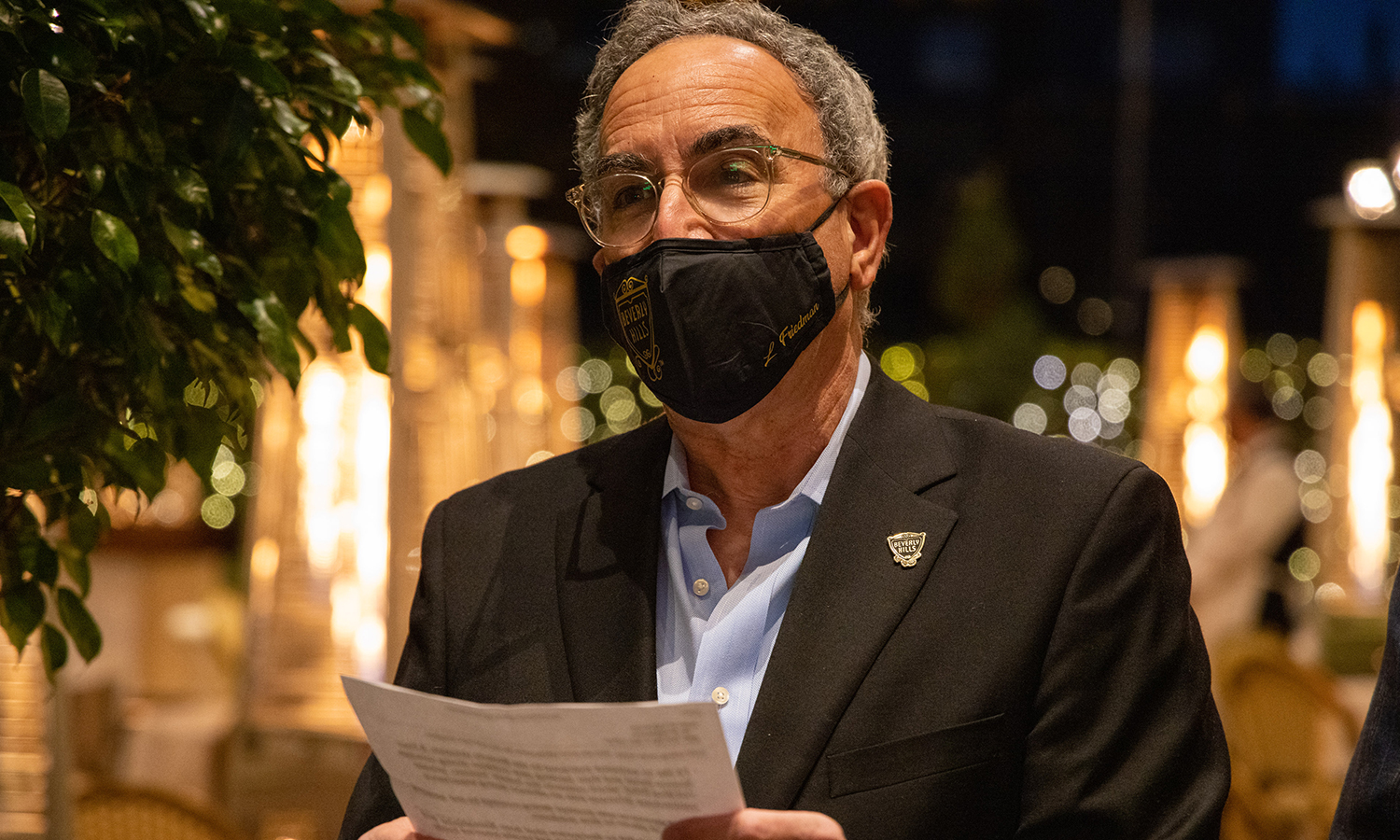
BHC: One of the biggest policy developments of the last year is the mixed-use ordinance. What are your thoughts about it?
Friedman: The mixed use is not something that all of a sudden came out this year. It has been around in the Planning Commission for quite some time. This is something that the Planning Commission carefully crafted, excluding certain areas, and really is a test to see whether or not it is going to be successful. I think it has a lot of promise, I don’t think it’s going to be overused, which was some of the concerns that were expressed initially. I think it is limited in scope, it was carefully crafted, and I look forward to seeing what is provided. Remember, it still has to come to council if there are issues, and we’re going to review the ordinance also. I’m very optimistic about it.
BHC: Looking back on the year, what are you proudest of?
Friedman: Other than what we’ve discussed already, I’m really proud of the fact that we were able to keep an even keel through everything that was going on.
Let me go back for a second. I was a student manager for John Wooden for five years, and as a student manager, I was a student of his. One of the things that he always taught us was that for every mountain high, there is a valley low, and he always taught us to keep an even temperament throughout any event. In basketball, when you win a game, you have an extreme high; when you lose, you have an extreme low. Back in my year, we won a lot of games, but he always wanted us to maintain our temperament at a midlevel. And that’s really the way I approach life, and [how] I approached my term as mayor. There were no real highs, there were no real lows, but we kept it an even keel. That’s really what I’m most proud of.
BHC: What advice are you giving to your successor, Councilmember Robert Wunderlich?
Friedman: I think Bob is excellently positioned for the role coming on. He’s an economist. He is a factually driven individual. He is going to do an absolutely terrific job on it. If there’s any advice I would give him, it’s something that I think he knows already, which is just listen. You learn a hell of a lot more listening than you do talking.



